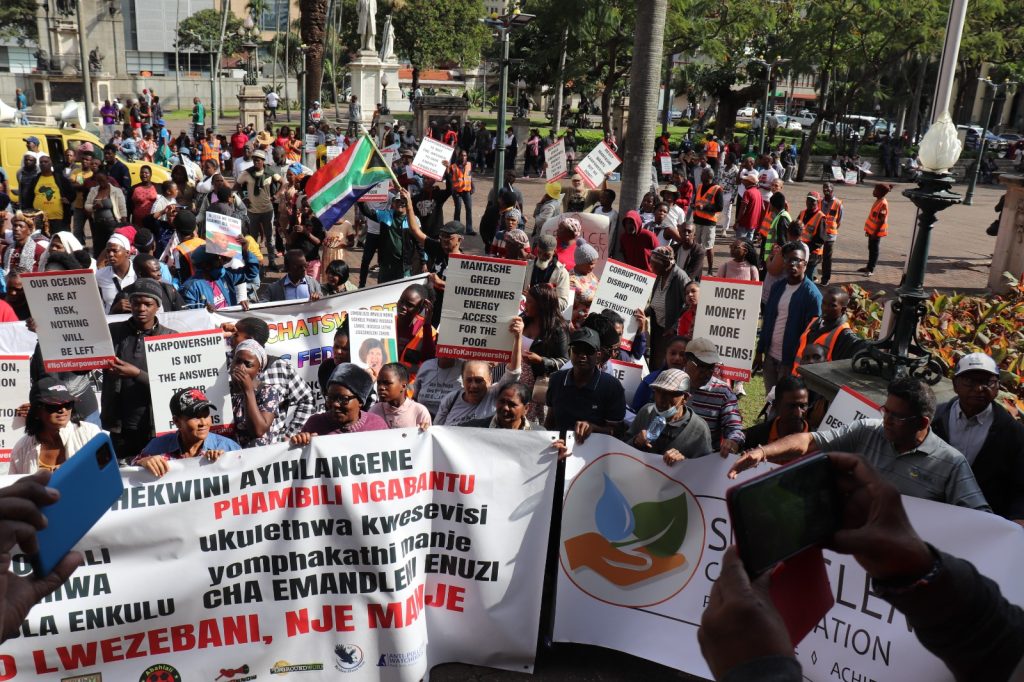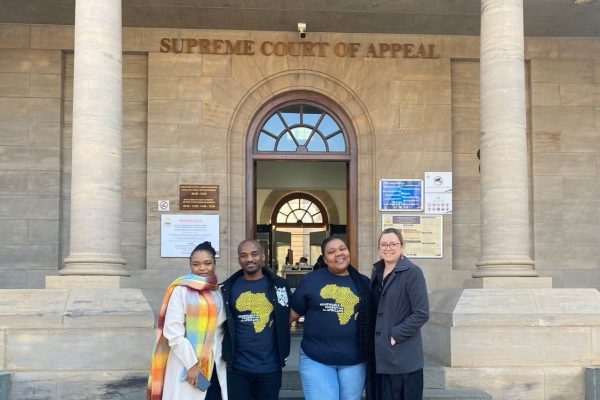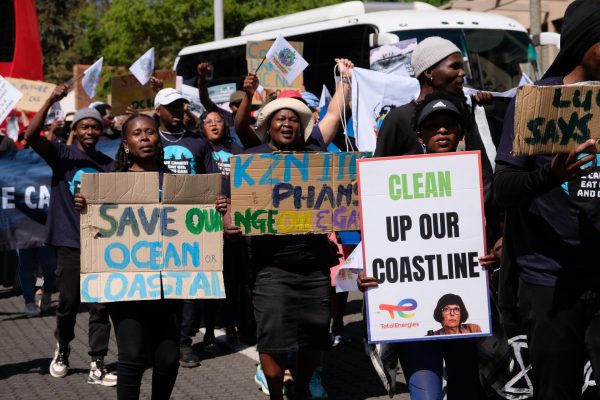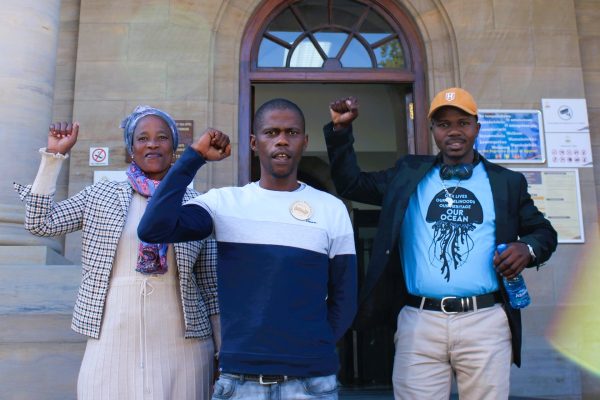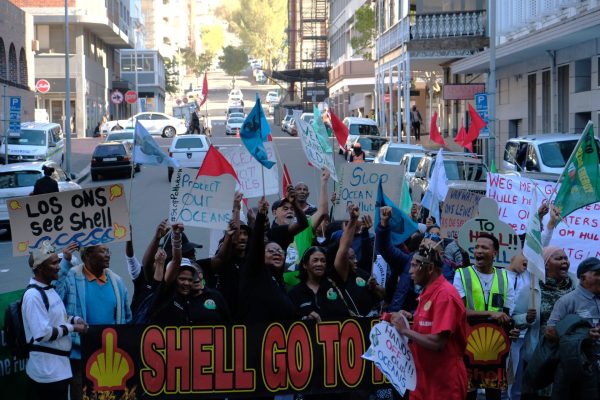South Africans are reaching their breaking point with loadshedding and suffering its increasingly devastating impacts, leaving many wondering why there is such strong opposition to Karpowerships, especially since it is being touted as the silver bullet the country needs to solve the crisis.
However, according to civil society organisations – including the South Durban Community Environmental Alliance (SDCEA), groundWork, The Green Connection, Natural Justice, and the Centre for Environmental Rights (CER) – South Africans must be wary of this deal which, if approved, could have far-reaching implications. The organisations say they question government’s ongoing and unwavering support of Karpowerships. Even though the company failed to meet so many crucial deadlines, government is still willing to bend over backwards to accommodate this Turkish-based company, since they were first introduced more than three years ago.
Therefore, last week on the 23 May 2023, as part of ongoing civil action to hold Karpowerships and government accountable, these organisations lodged a joint appeal against the Department of Forestry, Fisheries and the Environment’s (DFFE) decision to grant condonation to Karpowership SA, to allow for the late submission of its further-revised Environmental Impact Assessment (EIA) Report, for its Richards Bay application. However, it is important to point out that the condonation was applied for and granted, without proper notice or any public participation*.
According to the organisations, “This effectively allows Karpowerships to make substantial and significant changes to the EIA, including specialist reports, which is then subject to another public comment period. Whilst public participation must be promoted in decision-making, repeated amendments place a significant burden on society to actively respond each time. We believe that the process of granting the condonation was procedurally unfair. The lapsed EIA process could not be revived through the condonation approval. In terms of the National Environmental Management Act (NEMA), the appeal suspends the decision to grant condonation, and consequently, the processes that flow from this decision are also suspended. Therefore, by operation of the law, the EIA process for Richards Bay is suspended.”
“The stubborn refusal of Karpowership and its service providers to honour the EIA process, as given in South African law, is representative of its conduct in other countries. Locking Ghana, Lebanon, and other states into long-term energy contracts, which abuses the power of ordinary citizens to democratically choose their energy sources, being considerate of price, availability, and environmental protection. South Africans need to stand up and question why these powerships are being touted above all other options when it will not even address our energy crisis? The who, why and how needs to be publicly aired. Having a R200 billion investment sail away in 20 years is not a legacy for the youth of South Africa.”
groundWork Yegeshni Moodley
The civil society organisations say they are concerned about the Karpowerships deals following media reports that according to the Centre for Scientific and Industrial Research and and Departmenr of Mineral Resources and Energy’s price evaluation bids, Karpowership could cost R218 billion and lock South Africans into a contract over a 20-year period (or R10.9 billion annually). They say that loadshedding is already stymying South Africa’s economic growth, and this kind of expensive energy has a potential to increase the electricity prices, which may, in turn, have a knock-on effect on prices of daily cost of living for everyone. Not to mention the threat of unemployment for small-scale fishers in affected areas.
According to The Green Connection’s Community Outreach Coordinator Neville van Rooy, “Since it was first announced, the whole Karpowership deal has seemed dodgy. There were several critical discrepancies compounded by poor public participation processes with the small-scale fishing communities whose livelihoods would be affected by these vessels. The South African public needs to know what the real cost of these Karpowerships would be, as this decision could affect us long into the future. We cannot have these ships rammed down our throats.”
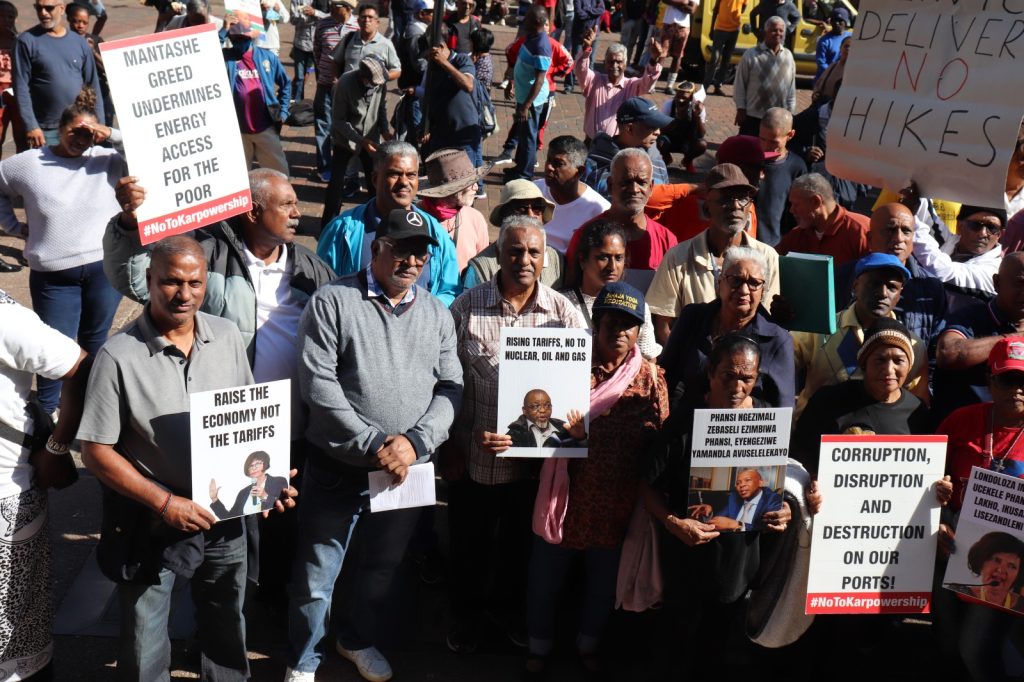
“Fishermen of Richards Bay do not want Karpowerships because it will destroy the fish, the plants and the beach, which we need to live and make a living.”
Nhlanhla Mbuyazi
The organisations also point out that Karpowerships are not going to end the ongoing loadshedding in its entirety. And because costs could also be affected by foreign exchange rates for gas, such inappropriate solutions can have unintended consequences and introduce new risks to energy security. South Africans cannot afford to be locked into an expensive energy contract, and take on more debt, which hinders development and general socio-economic wellbeing.
“For a country like South Africa, where many rely on the sea for survival including for food and as a source of income, food security and protection of indigenous, local livelihoods is also of concern. It is anticipated that in the near future, “oceans around South Africa will continue to warm and become more acidic, with severe implications for marine living organisms and attendant economic activities.” This is already happening in New Zealand, where a large number of wild and farmed fish were decimated, due to a prolonged heatwave in the surrounding ocean. As Karpowership may operate near fish and mussel farms, or breeding ground for fish, it is imperative then that all the impacts emanating from its activities are properly and adequately assessed, to ensure that South Africa’s food security is not jeopardised,” the organisations say.
South Africa is already experiencing the worsening impacts of climate change, such as prolonged droughts, Day Zeros, and flooding. From an economic perspective, the country has already spent approximately R900 million between 2016-2020 for drought relief, and this amount is anticipated to increase as climate change impacts worsen. Karpowerships cannot be part of a just transition because it would emit methane, a potent greenhouse gas into the atmosphere.
The organisations say, “This never-ending, incremental EIA process for Karpowerships, outside of the regulated process and timeframes, is an abuse of the EIA process. This is why we appeal the condonation application. Civil society has repeatedly expressed concerns about the inadequate public participation throughout the EIA process, and to add insult to injury, the public got no notice of any condonation application, until it was granted. It appears that there was no public participation on the condonation application itself. Question is, why did Karpowership need a fifth opportunity to include all relevant information in its EIA report? And, more importantly, why was it granted?”
“I want to reiterate my disappointment about how Karpowerships have been dealing with us as small-scale fishers and the coastal communities who rely on the ocean. We were not invited to the follow-up meeting with Triplo4 about public participation processes. It seems only commercial fishers were invited to the meeting. As small-scale fishers, we will continue to oppose Karpowerships because the area they want to moor is of great significance for us in terms of our heritage. Additionally, these ships will pose a threat to our fishing environment.”
Solene Smith, a small-scale fisher from Coastal Links Saldanha
“Karpowership has been unsuccessful in their attempts to moor their ships in the Richards Bay harbour. This is because the communities and fishermen of Richards Bay do not want another major polluting source on their shores. Many fishermen in Richards Bay rely on the ocean as a source of food and income and they do not want these Powerships coming and destroying the ocean. Will the decrease in loadshedding stages that come with Karpowership really be worth all the damage that will surely follow?”
SDCEA’s Tanica Naidoo
END
*Note on the Condonation Application
After the application for environmental authorisation was refused in 2021 because the EIA Reports were deficient, Karpowership was granted an opportunity to amend their reports to include the information that was missing. The amended EIA reports for all three Karpowership applications were released late in 2022, where the public was required to respond to all three applications during the December period. Notably, the Environmental Assessment Practitioner for Karpowership, Triplo4 Sustainable Solutions, denied the organisations a 2-day extension to submit their comments in this period.
Based on public comments, the EIA reports were amended and submitted to DFFE for a decision in January 2023. This was the final opportunity to ensure that all relevant information was included in the report, that comments from the public were addressed and that all reports were up to date. On 2 March 2023, the EIA application was withdrawn by Karpowership, and the Department subsequently confirmed that the application was closed.
However, Karpowership sought condonation to again amend their reports. No reason has been provided by Karpowership, or the EAP, Triplo4, as to why the amendments were made and why they were not included in the January 2023 versions. A request by the Centre for Environmental Rights for a copy of the condonation application, and for the Department’s reasons for the decision to grant condonation, has so far not been provided.
Links:

